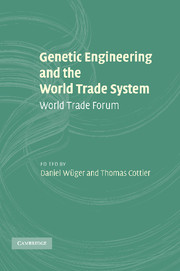Book contents
- Frontmatter
- Contents
- List of contributors
- List of abbreviations
- PART I Introduction and systemic issues
- 1 The many faces of modern biotechnology
- 2 Genetic engineering, trade and human rights
- 3 Gender dimensions of biotechnology policy and trade
- PART II Intellectual property and gene technology: issues at stake and possible options
- PART III Food security, trade and agricultural production with genetically modified organisms
- PART IV Food safety, international trade and biotechnology
- PART V Medical research, cloning and international trade
- Index
2 - Genetic engineering, trade and human rights
Published online by Cambridge University Press: 06 October 2009
- Frontmatter
- Contents
- List of contributors
- List of abbreviations
- PART I Introduction and systemic issues
- 1 The many faces of modern biotechnology
- 2 Genetic engineering, trade and human rights
- 3 Gender dimensions of biotechnology policy and trade
- PART II Intellectual property and gene technology: issues at stake and possible options
- PART III Food security, trade and agricultural production with genetically modified organisms
- PART IV Food safety, international trade and biotechnology
- PART V Medical research, cloning and international trade
- Index
Summary
The focus on trade regulation
Regulation of genetic engineering or biotechnology mainly pertains to domestic law. It is here that the processes of democracy and judicial assessment of fundamental rights and principles produce regulatory frameworks, commensurate with basic attitudes in society. Inherently, regulations vary from country to country. To what extent is there a need to involve international law and treaty-making? To what extent is there a need to achieve common and shared perceptions, and to regulate the interfacing of different regulations? These questions address the proper role of international law, and answers are far from clear, as the growing literature on the subject indicates.
In international trade regulation, all these questions translate into demands for market access and fair conditions of competition for competing biotechnological or genetically engineered products, on the one hand, and to demands for trade restrictions on the other hand. It is not a coincidence that trade law is the prime area where such divergences are truly felt in international law, and serious conflicts are emerging. It is submitted that a need to coordinate and integrate widely diverging attitudes and regulations primarily shows in this field of international law. Again, it is here that a necessary process of coordination and eventually of integration of different regulatory traditions and attitudes to biotechnology emerges.
Trade regulation essentially deals with the interfacing of different national legal orders and the different and diverging ways products and processes are dealt with. Commonly accepted products are traded widely, and mutually used.
- Type
- Chapter
- Information
- Genetic Engineering and the World Trade SystemWorld Trade Forum, pp. 17 - 55Publisher: Cambridge University PressPrint publication year: 2008



